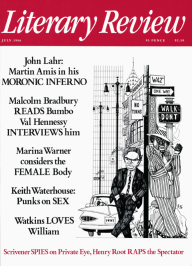Ray Ockenden
Rilke the Romantic
A Ringing Glass: The Life of Rainer Maria Rilke
By Donald Prater
Oxford 488pp £25
Letters, Summer 1926: Pasternak, Tsvetayeva, Rilke
By Yevgeny Pasternak, Yelena Pasternak & Konstantin Azadorsky (eds)
Jonathan Cape 256pp £15
Rilke had few masters, and no disciples; in a literal sense, his work is self-contained. It has never become an undisputed part of the 20th century literary canon, though it illustrates in exemplary fashion a discernible aspect of Modernism: the conscious turning-aside from the centrifugal tendencies of the modern age and the creation of an imaginative world scarcely shaped by historical or social realities. That his writing has continued to exert a powerful fascination on those – individuals, rather than groups – who accept its spell can perhaps be explained in terms of the magnetic attraction of willed self-sufficiency. In his work as in his life, Rilke demanded to be accepted on his own terms; and work and life were for him (as, in a different mode, for Kafka) indistinguishable. The project of shaping one’s life into a work of art is a familiar Romantic enterprise, which Rilke carried to an extreme of dedication. At 27, he could confidently maintain: ‘He who creates must be a world for himself, and find everything within himself.’
To separate biographical detail from written work might thus seem hazardous in Rilke’s case; but this is what Donald L Prater’s biography triumphantly achieves. His sources are not, primarily, the creative works, but Rilke’s copious letters, which, as Prater shows, are as much artistic creations as poems or prose, and

Sign Up to our newsletter
Receive free articles, highlights from the archive, news, details of prizes, and much more.@Lit_Review
Follow Literary Review on Twitter
Twitter Feed
How to ruin a film - a short guide by @TWHodgkinson:
Thomas W Hodgkinson - There Was No Sorcerer
Thomas W Hodgkinson: There Was No Sorcerer - Box Office Poison: Hollywood’s Story in a Century of Flops by Tim Robey
literaryreview.co.uk
How to ruin a film - a short guide by @TWHodgkinson:
Thomas W Hodgkinson - There Was No Sorcerer
Thomas W Hodgkinson: There Was No Sorcerer - Box Office Poison: Hollywood’s Story in a Century of Flops by Tim Robey
literaryreview.co.uk
Give the gift that lasts all year with a subscription to Literary Review. Save up to 35% on the cover price when you visit us at https://literaryreview.co.uk/subscribe and enter the code 'XMAS24'